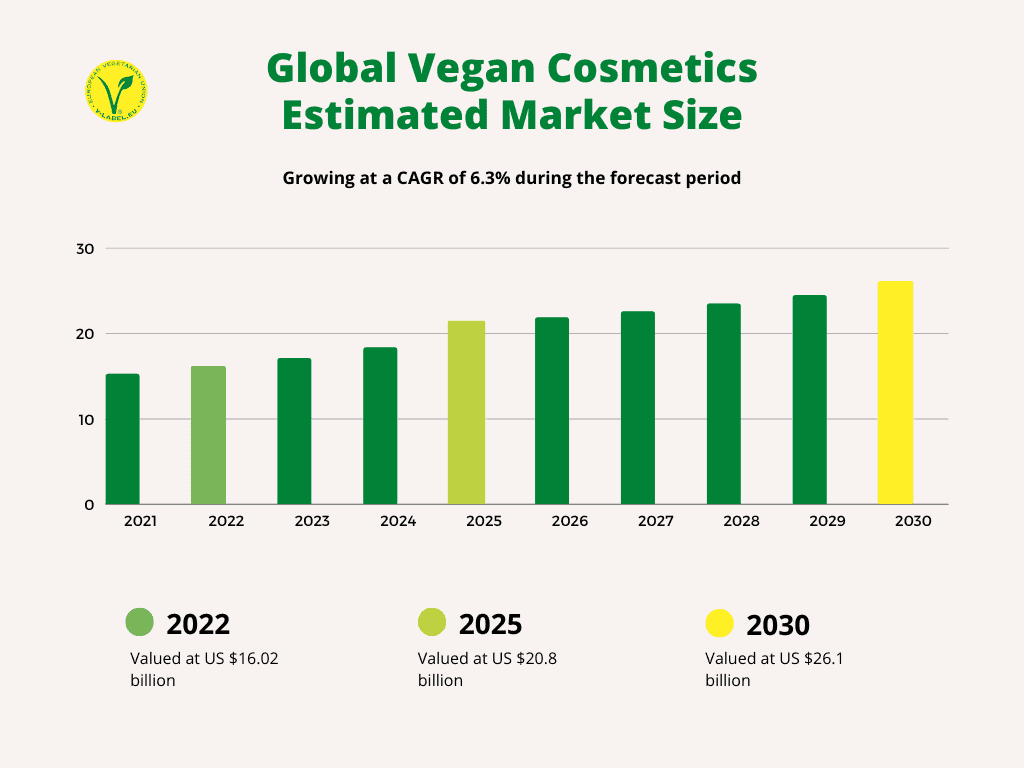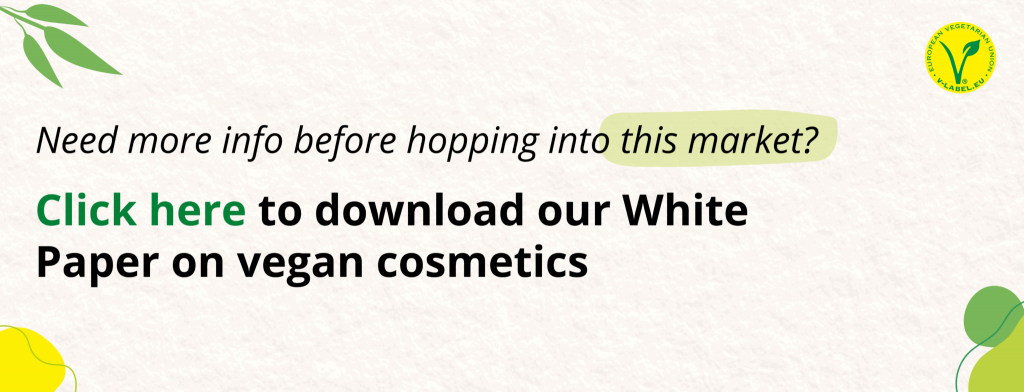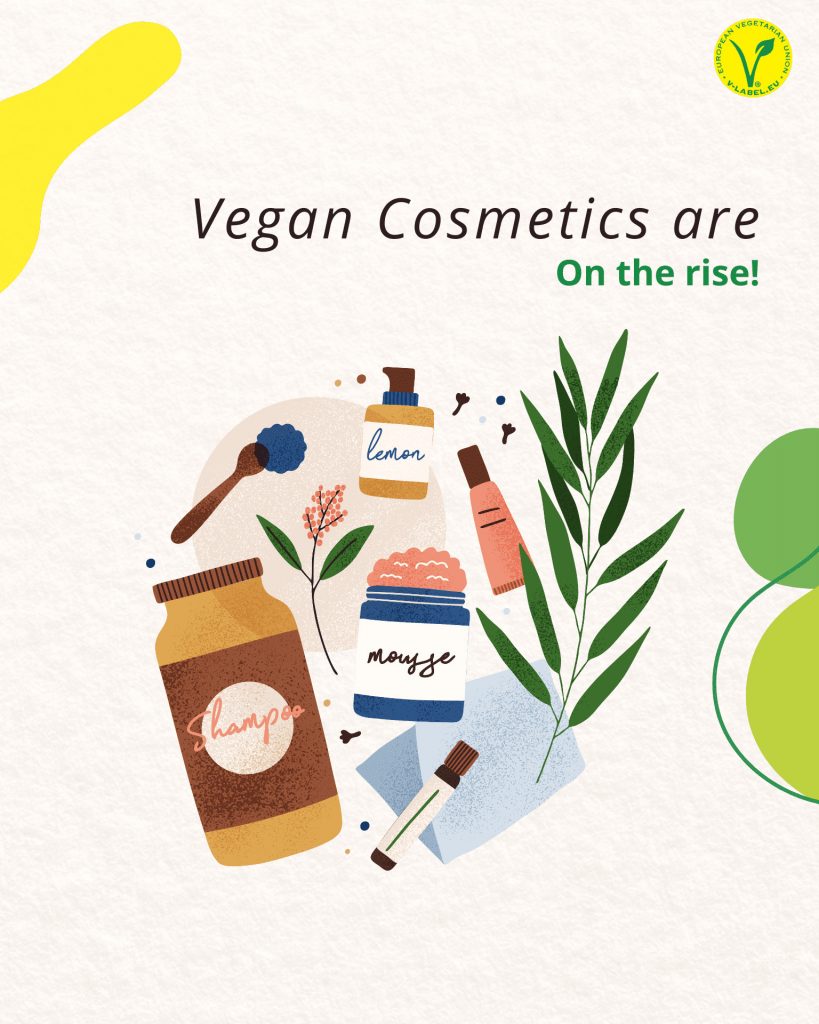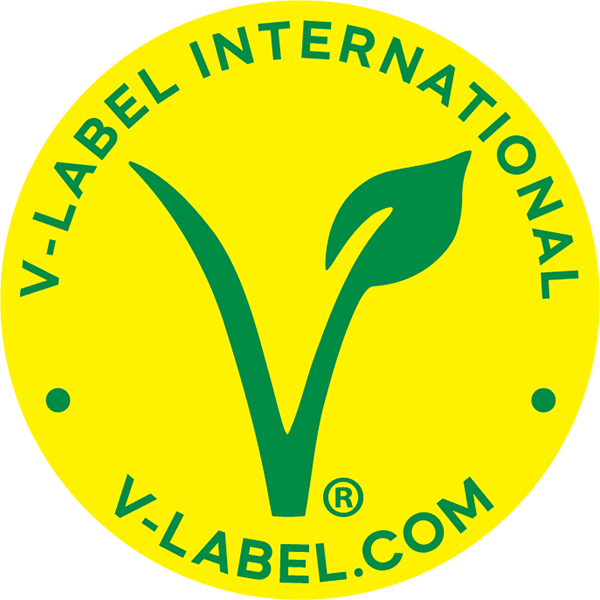Vegan Cosmetics Market: Key Numbers and Most Important Trends in 2022
The vegan cosmetics market is huge right now. And it’s only getting bigger.
So if you want to:
- Learn the key numbers of the market
- Get to know the trendiest categories
- See how brands are doing
…then you’ll love this post that V-Label, the world’s leading vegan & vegetarian trademark, has prepared for you. Let’s dive right in.
Key Numbers of the Market & Most Important Trends
So, why are consumers switching to vegan cosmetics? Well, they are more aware than ever of their choices and how it affects their future. The main reasons consumers switch to vegan products are health, well-being, and animal cruelty.
And you can see how these choices affect the market:

The global vegan cosmetics market was valued at US $15.17 billion in 2021, and now, in 2022, it’s sitting at US $16.02 billion.
But the future looks even brighter.
This market is projected to reach US $20.8 billion by 2025, growing at a CAGR of 6.3% during the forecast period, and US $26.1 billion in 2030.
At the moment, vegan cosmetics makes up only 2% of the whole market, so there is a lot of room for growth and plenty of opportunities for businesses.
Now let’s review which are the trendiest categories in the market:
- Skincare is the largest product category in the vegan cosmetics market, and is growing at a record 5.6% CAGR, expected to reach US $7.8 Billion by 2027. In 2019, skincare occupied about 35% of the vegan cosmetics market. And according to 1010data, online sales of vegan beauty products exceeded $342 million in 2020 and grew 83% from the previous year.
- The vegan hair care segment is currently growing at a 5.1% CAGR. In 2019, skincare occupied about 20% of the vegan cosmetics market.
- The make-up segment is estimated to reach 4.2% CAGR and has a global market size of $3 billion.
The Vegan Cosmetics Market in Asia, Europe, and North America
So, we just looked at the global market size. But how’s it doing in different parts of the world?
Here are 5 key facts you need to know:
- The largest market is Asia-Pacific, which makes up almost more than 40% of the global market.
- It’s followed by North America with 24%. The North American market size was valued at US $3.5 billion in 2021 and is growing at a 6.3% CAGR
- Europe is about 20-22% of the market at the moment.
- The size of the European market in 2022 is US $5.3 billion and is growing at a 7.8% CAGR

Examples of Successful Brands
As you can see, vegan cosmetics are no longer just another alternative category of cosmetics. Vegan beauty products are now sold at mainstream retailers like Sephora(who also added a whole vegan section to their selection of products), Ulta Beauty, and Target. It’s also filling the shelves of upscale boutiques like Bluemercury.
Brands are aware of the opportunities this market presents and have started to lean into it.
Here are 5 brands that are kicking it right now:
- The Body Shop is leading the change amongst established businesses, with over three million vegan products sold in 2018, and around half of their product range now being classified as vegan.
- Lush has around 95% of its products classified as vegan and has more than 900 stores all over the world.
- The Ordinary, which is 100% vegan and cruelty-free. They have a huge influence, having 1.5 million followers on social media.
- Milk Makeup is also 100% vegan and cruelty-free, and their 2021 estimated net revenue was $47 million. They also have over 2.1 million followers on social media.
- And lastly, a true pioneer in the beauty industry, Pacifica Beauty, which has been creating vegan cosmetics for the past 25 years and is still going hard.

What's Next
So, if you are considering entering the vegan cosmetics market, this is a good time:
- Millennials and Gen Z’s are going to make up 70% of the global population in 2030. These two generations are the leaders of change, not willing to settle for the status quo.
- We can expect to see a big shift from animal-based products to plant-based products in every segment.
- Veganism should not be considered a niche anymore, and as we saw, numbers back this up.
If you want to learn more, check out our webinar on vegan cosmetics or download our White Paper.

 Argentina
Argentina België (NL)
België (NL) Bosna i Hercegovina
Bosna i Hercegovina Brasil
Brasil Chile
Chile 中国
中国 Česká republika
Česká republika Colombia
Colombia Costa Rica
Costa Rica Danmark
Danmark Deutschland
Deutschland Ecuador
Ecuador España
España France
France Ελληνικά
Ελληνικά Hrvatska
Hrvatska Italia
Italia Lietuvių
Lietuvių 한국어
한국어 Magyar
Magyar Lebanon (EN)
Lebanon (EN) Melayu
Melayu Mexico
Mexico Nederland
Nederland Nigeria
Nigeria Norge
Norge Österreich
Österreich Perú
Perú Polski
Polski Português
Português Română
Română Русский
Русский Slovenčina
Slovenčina Türkçe
Türkçe South Africa
South Africa Suomi
Suomi Svenska
Svenska Schweiz
Schweiz Українська
Українська الامارات العربية المتحدة
الامارات العربية المتحدة Tiếng Việt
Tiếng Việt